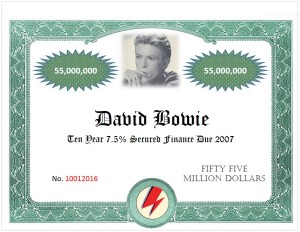David Bowie Special – the story of Bowie Bonds

David Bowie passed away on 10 January 2016. Best known for his music, he also holds a unique place in the history of financing
Like many people of my generation, I was saddened by the death of David Bowie. His early hits came out at around the time I became interested in popular music, and his most successful years coincided with my teenage years.
Less well known is that David Bowie was the creative force behind an asset-backed bond issue in 1997.
Bowie Bonds
An investment banker, David Pullman, came out with an idea that allowed David Bowie to receive money up front for the next ten years of royalties arising from his work prior to 1990. This raised $55m for Bowie, who used the money to buy the rights to his material that he did not already own. The bonds paid a generous 7.5% interest, with investors taking the risk that the interest was contingent on sufficient royalties being generated by the back-catalogue.
It has never been publicly revealed which music was covered by the bond issue because the prospectus was never published. Indeed the whole transaction involved just one other party – the Prudential Insurance Company of America. Strictly speaking this wasn’t a bond issue – there were no bonds created as such – it was a securitised financing deal, much like a mortgage. And like a mortgage, it has to be repaid in full. Again, it has never been revealed when or if that repayment happened, but consensus has it that the deal was for 10 years and was therefore repaid in 2007. Where did Bowie get the money from? Royalties and receipts from music not covered by the issue, and which Bowie would have retained, would unlikely to have been sufficient to repay the $55m. But Bowie is not poor, and could have afforded the repayment from his personal assets.
The financial model behind Bowie Bonds has been used by other artists, and is especially relevant to those with a large back catalogue that keeps on generating royalty income from sales and airplay.
Were they a good deal?
For David Bowie? Yes, probably. He was able to gain full ownership over his material with the proceeds and offset some risks of his fame and consequently his earning power falling. Although if he defaulted on the bond interest or capital repayment, he would likely have lost the rights to the material covered by it.
For the Prudential Insurance Company of America? Again, yes, probably. 7.5% was a good rate of interest even in 1997, and there really was little possibility of default. Nevertheless the credit rating of the bonds was reduced in 2004 as the effects of file sharing and internet piracy started to bite. People simply weren’t paying for music!
So who lost out? If the transaction was good for both parties, then how is this not a zero sum game? Well, I guess it’s to do with timing. Bowie wanted the money in 1997 but PRU were more interested in a good rate of return. Again, the comparison is with a mortgage. When we repay our mortgage we have a house that’s totally ours. We probably care more about ownership than we do about whether we could have got a better rate of return investing into something else. Bowie would have considered the same thing with his music. Owning his back catalogue gave him full control over something he could do something about. And the financing meant he could do that in 1997 rather than at some uncertain date in the future, during which time other people would have profited from his work. So if anyone lost out it was the consumer!
Musical legacy
To say the consumer lost out sounds heartless. And it is. We have enjoyed David Bowie’s music for the best part of 50 years and while it’s fashionable to dislike people who get rich, why shouldn’t he capitalise on his talent? For someone who was playing rock music in the 1960s and whose debut single was the unlikely “The Laughing Gnome” (which charted in 1973 on re-release) yet still managed to chart at number 1 (Space Oddity) in 1969 and as high as number 6 as recently as 2013 I don’t think we can complain. Bowie bonds might have come and gone, but we’ll be listening to his music forever.
David Bowie’s discography is available here







